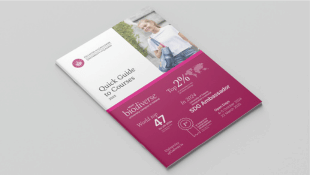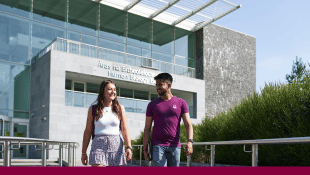-
Courses

Courses
Choosing a course is one of the most important decisions you'll ever make! View our courses and see what our students and lecturers have to say about the courses you are interested in at the links below.
-
University Life

University Life
Each year more than 4,000 choose University of Galway as their University of choice. Find out what life at University of Galway is all about here.
-
About University of Galway

About University of Galway
Since 1845, University of Galway has been sharing the highest quality teaching and research with Ireland and the world. Find out what makes our University so special – from our distinguished history to the latest news and campus developments.
-
Colleges & Schools

Colleges & Schools
University of Galway has earned international recognition as a research-led university with a commitment to top quality teaching across a range of key areas of expertise.
-
Research & Innovation

Research & Innovation
University of Galway’s vibrant research community take on some of the most pressing challenges of our times.
-
Business & Industry

Guiding Breakthrough Research at University of Galway
We explore and facilitate commercial opportunities for the research community at University of Galway, as well as facilitating industry partnership.
-
Alumni & Friends

Alumni & Friends
There are 128,000 University of Galway alumni worldwide. Stay connected to your alumni community! Join our social networks and update your details online.
-
Community Engagement

Community Engagement
At University of Galway, we believe that the best learning takes place when you apply what you learn in a real world context. That's why many of our courses include work placements or community projects.
Health Matters
Health Matters
This section will deal with (1) Medical Care in Ireland; (2) Students with Disabilities; (3) Psychological and stress-related problems.
Medical Care in Ireland
Ireland is regarded as a low-risk destination with good and modern healthcare standards. No particular vaccinations are recommended for visitors.
There is a Student Health Unit on campus; doctor and nurse visits are usually free but there are charges for some of the services offered. The unit is staffed by two doctors, two nurses, a physiotherapist and a sports injuries therapist, who are there to meet the needs of students with any medical problems. Referral to other agencies and specialist services is available as required. Please note that the Student Health Service does not cover the cost of prescribed medicine, hospitalisation, or optical or dental treatment. Students are therefore advised to have a thorough medical check-up before leaving home.
All European Union students are eligible to avail of the medical services in Ireland. However, in order to do so, it will be necessary to bring with you a European Health Insurance Card, which is available at local health authority offices in your home country. You should arrange to obtain this card prior to your departure from your home country, as it will be more difficult for you to acquire it once you have arrived in Ireland.
Students from EU Member States in possession of the European Health Insurance Card are entitled to access healthcare in a public setting whilst studying and/or on a temporary stay in Ireland. Students may have entitlement to a Medical Card under EU regulations provided they have documents from a competent institution in another Member State stating they are still insured in that state or a dependant of an insured worker. If a student is insured in Ireland, the application for a Medical Card will be assessed on means and on residency. This card, which can be requested from the local Health Board (HSE) in Galway, entitles students to free health care, including visits to the local doctor, all necessary in-patient and out-patient treatment in public hospitals, and drugs and treatment as prescribed. If you obtain a medical card, you should ensure that the doctor in your area with whom you are registering is a member of the GMS (General Medical Services) scheme.
If you are not an EU citizen, and particuarly if you require a visa to study in Ireland, then you should read the health insurance information for non-EU students.
We would recommend that, before leaving their home country, Erasmus students purchase travel insurance in addition to their EHIC: the cover provided by the EHIC may turn out to be quite limited, and it will not include any private healthcare costs or the cost of repatriation (if you have to be flown home in the case of acute illness). Most travel policies will include additional cover for medical emergencies. It will also give you peace of mind to know that you have cover for situations like cancelled flights and the loss/theft of luggage, personal belongings or money. However, please make sure that you understand fully the terms of your travel insurance policy and that it meets your needs.
Students who require private medical insurance should make arrangements for cover prior to departing from their home country, or alternatively they can contact health insurance companies in Ireland which offer private medical cover. This, however, can be very expensive, and medical cover may not begin immediately.
Students from non-EU countries attending University of Galway for less than the full academic year are required to pay full charges for in-patient and out-patient services in a public hospital and all charges for doctors' services, drugs and medicines. Such students are accordingly advised to hold a comprehensive health insurance policy to meet any costs accruing from health care treatment in Ireland.
If you have an ongoing, pre-existing medical condition (e.g. asthma, heart disease, diabetes) we recommend that you contact the Student Health Unit (healthunit@universityofgalway.ie) before you arrive, in order to ensure that your medical needs can be met here. Some overseas medications, for instance, may not be licensed for use in Ireland or may be marketed here under a different name. You should also …
- see your doctor before you travel;
- explain the nature of your trip and ask for a letter detailing your condition and any ongoing need for medication or equipment (it may be useful to have this translated into English);
- get legible updates of all your prescriptions, and remember to ask for generic drug names as brand names often differ abroad;
- bring all relevant medical documentation from home with you, as well as your doctor's contact details;
- bring a supply of your medication in case you might have difficulty obtaining an equivalent here;
- when you are travelling, keep your medication in your carry-on luggage in case your other baggage is lost or delayed;
- register with the Student Health Unit on your arrival at University of Galway so that they are aware of your condition.
Students with Disabilities
Students who have a disability or learning difficulty are advised to contact the Disability Support Service before they arrive in Galway. This is to ensure the appropriate supports and resources are available to them if necessary.
Students with psychological or stress-related problems
Any students who are already attending a professional in their home country for psychological or stress-related matters are strongly urged to seek the advice of this person regarding the appropriateness of travelling abroad to study. It should be borne in mind that studying abroad will require a significant readjustment in terms of the new environment, and this can cause a certain amount of stress; moreover, such students may find it is not always possible to avail of the same level of support in a foreign country as they had been used to at home. For these reasons, we do not recommend that students with severe mental illness take up an overseas placement: our experience in the past has been that for such students, what was hoped would be an enjoyable and rewarding visit to Ireland ends up being a time of loneliness, isolation and even distress.
Please do remember that if you find yourself unable to cope with the transition, or if you experience any other psychological or stress-related problems during your time at University of Galway, you should not hesitate to contact our Student Counselling Service: staff there will be only too happy to meet with you and will endeavour to provide whatever level of psychological support you require.
Downloads
-

Undergraduate Prospectus 2026 PDF (12.4MB)
-

Postgraduate Prospectus 2026 PDF (3.2MB)
-

Quick Guide to Courses 2026 PDF (1.20MB)
-

A-Level Quick Guide to Courses 2025 PDF (1.04MB)
-

Pre-Arrival Guide 2025 PDF (1.6 MB)
-
.png)
Brazil Student Guide PDF (3.2 MB)
-
.png)
Chile Student Guide PDF (3.1 MB)
-
.png)
Colombia Student Guide PDF (3.1 MB)
-
.png)
Ghana Student Guide PDF (3.4 MB)
-

Hong Kong Student Guide PDF (3.6 MB)
-

Indian Student Guide PDF (3.5 MB)
-
.png)
Indonesian Student Guide PDF (3.2 MB)
-

Malaysian Student Guide PDF (3.6 MB)
-
.png)
Mexico Student Guide PDF (3.1 MB)
-

Nigeria Student Guide PDF (3.4 MB)
-
.png)
North American Student Guide PDF (2.9 MB)
-
.png)
Panama Student Guide PDF (3.1 MB)
-

South African Student Guide PDF (3.7 MB)
-
.png)
Taiwan Student Guide PDF (4.0 MB)
-
.png)
Thailand Student Guide PDF (3.6 MB)
-
.png)
Turkish Student Guide PDF (4.2 MB)
-
.png)
UAE Student Guide PDF (3.4 MB)
-
.png)
Vietnam Student Guide PDF (3.39 MB)















